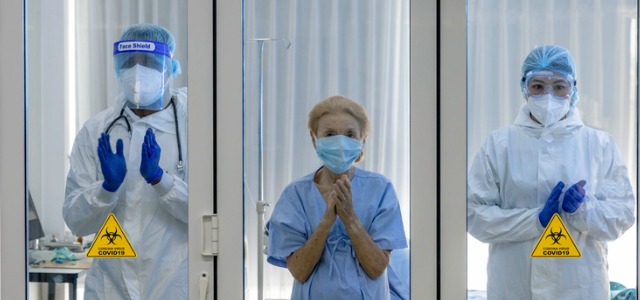Insurance and the Coronavirus - Shaping the future

As lockdown starts to ease and the number of Coronavirus infections in Europe reduces, working from home remains a necessity. While the full impact on companies is yet to be revealed, they continue to find ways to operate. In the insurance industry, as in other financial service sectors, the wonders of technology can help us to stay in touch with colleagues and clients, to complete our work, to sustain a high level of service, and to maintain some human connection (on screen at least).
Panellists:
- Jane Hayes - Underwriting Director at Lloyds Market Association
- Julia Graham - Deputy CEO and Technical Director at AIRMIC
- Simon Sloane - International Arbitration Group Head & Partner at Fieldfisher
- Sarah Civil - UK country manager Abaco International Loss Adjusters
- Caroline Woolley - Director at Meaden & Moore International, Forensic Accountants (facilitator)
Online panel debate - hosted by Fieldfisher.
In this instance, technology provided a platform for the panellists to discuss and debate issues, with the audience (each in their own home). We brought together professionals that represent the different perspectives of our industry from Insurers to Insureds, Brokers to Loss Adjusters, Lawyers to Forensics Accountants.
The aim was to open up the discussion on the impact of Coronavirus on the insurance industry, let people have their say, and not just 'teach' from a single point of view. We wanted to have a live debate and home-in on some of the specific issues with Coronavirus to see how we, as an industry, can help shape the future of insurance. All panellists agreed to avoid hindsight recommendations and were mindful that, as in all aspects of our lives, everyone should remain respectful of the views and opinions of others. It was also agreed that we should not discuss anything that is subject to current litigation, including policy interpretation.
We welcomed questions in advance from those invited to attend and asked for questions to be submitted during the session from those watching the event unfold. There was so much to cover in such little time. Such wonderful questions deserving of thorough analysis, but concise verbal responses would at least whet the appetite of all involved.

Every challenging situation can be used to drive innovation and positive action. How can the insurance industry capture this opportunity?
Julia Graham, deputy CEO of AIRMIC picked up this first question and ran with it. As representative for risk and insurance managers based in the UK, AIRMIC also links with associations around the world.
Driving innovation is vital and could be viewed in three main areas - products, services and systems. The industry has actually shown a slick transition from operating in quite a traditional way into full use of technology.
"Although it can sometimes feel like an industry that acts much like an oil tanker, it can take some time to change direction, recently the insurance industry has been more like an ocean going yacht, that is remarkably agile…As we move towards the next normal over the next few months I have got high expectations that opportunities in cost savings and efficiencies will continue to be realised.'
As the industry becomes more streamlined, and overhead issues are addressed, the key is to focus on the customers' needs and their understanding of the contracts in place. Collaboration in innovation is essential, but the driving force comes from the customer. The customer must be included early on in any process of development.
'The industry is at a critical point, the hardening market that we were already experiencing before Covid-19 has forced some buyers to look elsewhere to alternative risk transfer options. An ill-judged response to the pandemic will only seal that need to look elsewhere…Insurers have always said they want to be our partners, along with brokers, and now is the chance. We all want this industry to succeed.'
In such times, innovation can sometimes take a back seat as people look to consolidate rather than invest. But we should seize this opportunity, this challenge that Coronavirus has laid before us.

Coronavirus is considered a systemic risk. Can insurers provide answers to such risks now or in the future?
Jane Hayes, Chief underwriting officer at the Lloyds Market Association opened with statistics to set the scene and the boundaries. The numbers quoted in relation to the impact of Coronavirus on society outstrip the private insurance market by many multiples.
'The UK Government are currently spending approximately £40bn per month (around £14bn on furloughed workers scheme, £15bn on grants for small businesses, and £10bn on the self-employed scheme), whereas the annual income of the general insurance industry is £100bn per annum, it is therefore not sustainable for the insurance industry to take this risk as a whole.'
The magnitude of the numbers means collaboration with Governments is required, but insurance remains relevant and part of the solution in the long term. Some classes of businesses for Insurers will have already been hit hard (for example contingency/events cancellation and travel policies). Insurers and reinsurers must come together to ensure a viable option remains open in these areas.
'There is a clear need for solutions for systemic type losses - pandemic risk as well as cyber risk - where there is a potential for lack of diversification of risk for Insurers and the ultimate potential for accumulation of risk. Insurers, the State and others must work in joint participation to shoulder the magnitude of such losses. Examples include TRIA in the US (with a government back stop), PRIA (proposed in the US for pandemic risk) and Pool Re closer to home in the UK.'
Premiums are collected through insurers and the Government is used as a backstop. Having Insurers at the forefront means we can maximise the use of the expertise on offer. There are other possible solutions which are already used such as, parametric trigger policies and bonds which move away from traditional measures for paying claims. The parametric cover for pandemics had been available in the market, but it can be complex to place, and few people have purchased it.
'Underpinning this is an urgent need for upskilling in underwriting, and harnessing the use of big data to establish hard to assess prices…what is clear is that 'pandemic' cover is a product in its own right and is too important to be a bolt on to other policies.'
There are many options are being considered in this era of new product development, including the use of the existing insurance systems just for gathering premiums and distributing funds, and pooling systems such as PAN RE being considered by a committee headed by Stephen Catlin. RECOVER RE is another, which is a long-term funding vehicle to buy Business Interruption cover, pay early but recoup funds in the future. There are many questions and many needs, but the insurance industry cannot answer all the questions alone.

It is clear that we need to remove doubt and uncertainty in policies. What are the options for making progress in this area?
Simon Sloane, partner at our host firm Fieldfisher, and Lead of their International Arbitration Group has more experience than most in dealing with disputes that arise from doubt and uncertainty in contracts. However, he works hard in avoiding disputes where possible by working with Insureds and Insurers up front (before a loss occurs).
'As the COVID-19 insurance crisis has highlighted there is an urgent need, and an opportunity, for insurers, brokers and Insureds to review their BI wording to ensure there are clear terms of what is, and what is not covered. The non-damage BI extensions to cover merely exacerbate the lack of clarity.'
Insurance provides critical stability to global industry but it is vital that the BI wordings respond properly to the risks the policyholder expects them to cover. Now is the time to clarify these issues.
Unfortunately, BI wordings have a long history of coverage issues and many of these issues could have been clarified sooner. The CILA BI report of 2012 highlighted many key concerns with BI wordings, including, for example ,the 'trends' clause. An Airmic report in 2016 raised key issues in BI and offered some solutions. However, the Introduction section of the CILA 2019 report states these concerns continue to be an issue for claims adjusters and policyholders.
While all contracts have an inherent lack of clarity due to the fact that each party will have a subjective interpretation of the contract, it is critical that the BI wordings are properly re-drafted now to remove the any uncertainty set out in them. A policy is a contract like any other, so this is not unique to the insurance industry.
'There is no silver bullet to solve these issues, or it would have been used already. Some of the issues have seen some improvement, but some insurers have retained flexibility to deal with claims, especially when they have one eye on their reinsurer recoveries… It is worth noting that the subjective intention of the parties is irrelevant in contract interpretation where the language is clear on the face of the document. '
The use of artificial intelligence and 'big data' is available to easily facilitate the large scale re-papering of policy wordings, as has been done in other industries in the past such as banking, and it is critical that all wordings are now reviewed for lack of clarity (in the BI element of policies, including cyber).
It is also important that brokers manage policyholders expectations (for example the application of the trends clause in natural catastrophe claims which can reduce cover the greater the impact of the event in a region). The industry does not sell pandemic cover as a standard product, although it is available, but if they sell 'non-damage' BI cover then they need to state in the policy clearly what does not fall within the scope of the extension to avoid the confusion we currently see in the market. Obviously, the other tools of pre-loss stress testing and modelling also need to be used to ensure the coverage does what everyone expects it to do.

We all search for silver linings; how can the industry learn from this?
Sarah Civil of Abaco International Loss Adjusters picked up the baton for this question. One good result would be working collaboratively at an earlier stage in the insurance process, for the good of the customer, the policyholder, who, let us not forget, pays all our salaries in the insurance business.
Too often, we are collectively underwriting after the event. Wordings get sent to lawyers to tell us what we are covering and for the customer to find out, when it is too late, what they have actually bought. We might be dreaming of Utopia and some events will never be foreseen, but others, such as pandemics, have been.
"I was doing pandemic planning many years ago, so I am sure that others had thought hard about it too."
Although no one could have predicted the extent of the impact on business and life through such unprecedented lockdowns. No one could have predicted the slightly unfair attitude towards Insurers either.
'Nobody should expect the benefit of policy cover for risks they did not intend to buy cover for, or had consciously decided was too expensive. However, neither should a policyholder find that a breakdown in communication between them, their broker, Insurer, Lawyer, Loss Adjuster means that they have paid for something that doesn`t deliver. We still see too many 'copy and pasted' wordings leaving room for all sorts of interpretations.'
Also, it is getting better, but we could also get underwriting and claims working more closely together, across the board. We all work in our sectors, or to use PC terminology (post coronavirus), our own bubbles. We all quote lack of time in dealing with these issues upfront, but we have to find the time when wordings are being disputed later, so it is actually time well invested.
'So perhaps if something good comes out of the Coronavirus pandemic for the Insurance Industry it would be more collective collaboration to ensure that all parties really understand the risks that are Insured, and those that are not, when Insurance is placed. This may mean additional training in some areas but wouldn`t that be a good thing. Maybe we can hope that in the future Insurance is not just bought on price but on an understanding of the coverage and value that is being offered.'
The key is collaboration, all parties must look carefully at cover, identify issues, discuss in advance, with claims and underwriting, lawyers and accountants, adjusters, brokers and Insureds. A little bit of time invested upfront is worth so much post event.
Caroline Woolley previously worked for a broker and always promoted pre-loss analysis. As independent Forensic Accountants, Meaden & Moore can help with such exercises:
'I always used to say I'd much rather be sitting around, having a cup of tea, playing let's pretend you have a loss, and discover any issues at that early stage (rather than post loss when nothing can be done about it). Experience shows that no one likes those sort of surprises. We could even use the current situation to quantify losses, whether Insured or not, and use that data to better inform Insurers of the income at risk. As an Accountant I always come back to the numbers, but it's vital to quantify losses to establish cover requirements and exposures faced.'

New product development should be a two-way street - how can Insureds help develop new policies to be offered?
Jane Kielty, Managing Director of UK Retail at Aon is well placed to consider this question. To begin with, how we communicate policy language and how coverage works is way too complicated. Our customers cannot be expected to listen, understand and retain information on each clause. Without clear guidance, we might be misleading our customers. We need to take a step back, and think about risk management before the policy is even considered. At those early stages, once risk has been identified, it must be managed.
'Insurance tends to respond to only 20% of the key risks our clients face. Is it about Insureds helping to make new policies, or should it be a step change in how we help organisations to manage the risk they face? It's not just an upskilling of underwriters or brokers, it's a completely different skill.'
As an industry we rely on the past as a prediction of the future, but this is not necessarily going to be the case. We talk about black swan events, that may not happen again for hundreds of years. It is a very difficult task to develop cover for such events. The next one will probably look very different. We need to think more holistically about risk and how we could deal with it. Complicated contracts can mislead, one option is that we can look at the event not the impact.
'Even Governments will struggle to cope with the impact of Covid globally. Cash flow is essential for the survival of organisations, but the insurance industry will take months to work through responses. Alternatives such as parametric solutions have a defined benefit and pay out a fixed pre-agreed amount to help in that initial loss phase facing businesses. We need a completely different solution, and Insureds could better articulate the risk in their business, and the need they have, in developing those solutions.'
Caroline Woolley agreed on the importance of risk management, which always comes before any risk transfer (or more correctly - risk treatment).
'An influential German risk manager once stated at a panel event at a FERMA conference, that insurance is not risk transfer, a company can never transfer its risk. The risk stays with the company and must be managed, but part of the possible risk treatment is insurance. Also, a Dutch colleague once said that insurance is just a big bag of money, the important part is getting it quickly and then knowing how to spend it wisely.'
Julia Graham added 'We do need to understand risk before we treat it, but we also need more differentiation in the market between good and not so good risk. We are limited as a sector as to how we recognise good risk management. One of the innovations required is more attention paid to the quality of the risk management, not just the cover and the price.'
Through organisations such as AIRMIC and the LMA, through industry specific work with brokers, through partnering with Insurers, helping with data and with opinions, existing solutions can be improved, and new ones developed. But it is collaboration that is key to success.

What role do you see for captives, and alternative reinsurance of captives, for pandemic cover now and in the future?
It is worth considering risk in sub sections for insurance purposes, starting with events that are insured, events that are uninsured, and events that are uninsurable. The use of captives for incubating risks not covered elsewhere is one thing, but for those that are uninsurable, (such as some non-damage business interruption risk) it is quite different. Captives can be beneficial to collect data on insurable risks and learn from the claims experience, but sometimes there is not sufficient volume to gather the correct data for those risks that are uninsurable. The risk can sometimes be reinsured out for specific events but putting events into a captive because the market can or will not provide it, such as Directors & Officers, can be risky.
Julia Graham, who sits on the board of captives, commented:
'The use of captives in this way should be exercised with caution if we want a healthy industry. We can't always expect the Government to step in or captives to underwrite deficiencies.'

Will the London market ever get back to normal?
There will be a new normal (although this is overused phrase) but it is probably too early to know exactly what that will look like. Everyone has had to adapt. All those who said that they could never work from home have had to find a way and employers are bound to want to bank some of those cost savings on office space as soon as they can.
Sarah Civil stated
'No one has a crystal ball, but one might envisage more hot desking, travelling into London only for key meetings but definitely more use of Zoom and Teams on a regular basis. It is unlikely that we will lose the social side of working in London but there will need for more pre-planning to ensure you end up in Leadenhall Market at the same time and place as those that you want to meet up with.'
A time of crisis is also a time of opportunity to reflect on how we can do things better and more effectively. Memories are short, but traditions run deep. It will be interesting to look back in six months' time and see if we did find a new, more efficient, normal, or if we just went back to working life as before.

What is yet to come from Coronavirus and its impact?
This became a quick-fire round, the issues raised included:
- current and future supply chain interruptions
- trade credit restrictions
- contractual disputes
- further cases going to trial
- the results of the FCA test cases
- further contingency/events cancellation claims
- impact on existing claims as a fresh and intervening cause
- possible issues with machinery on start-up, increased machinery breakdown claims
- confirmation of capacity and availability of insurance
- possible government backstops
- Directors & Officers claims
- Employers liability claims in relation to how they dealt with Coronavirus
- other liability insurance claims
- cyber issues as a result of increased working from home and dispersed security measures…
Simon Sloane added: 'Clients seem willing to discuss issues initially and are not necessarily jumping to litigation. It is clear there is much more to come in terms of direct impact as well as indirect consequences.'
Conclusion
The positive attitude and feeling of optimism from the group was like a breath of fresh air. As all corners of our industry came together to collaborate on feasible solutions to help businesses deal with some of the world's problems, we realised that everyone really wants to help and contribute. Insurance can provide the means to help businesses survive most things, but a global pandemic calls for both Industry and Government support too.
Caroline Woolley of Meaden & Moore summed up 'As hopefully personal tragedy starts to lessen and some sort of normality emerges, we all search more for silver linings to the Covid cloud. The industry is trying to react, but it needs to make the most of this time, develop improvements to existing cover, harness innovation, facilitate increased understanding of cover to avoid surprises and embrace the improved collaboration.'
The panel discussion could have continued, as we had more questions that we wanted to cover and so much more to hear from the panellists, but we ended on time and gave enough food for thought to keep the industry going for a while to come.
Authors:
- Caroline Woolley - Meaden & Moore International Forensic Accountants cwoolley@meadenmooreintl.com
- Simon Sloane - fieldfisher Simon.Sloane@fieldfisher.com
- Sarah Civil - Abaco International Loss Adjusters scivil@abacoadjusters.com
